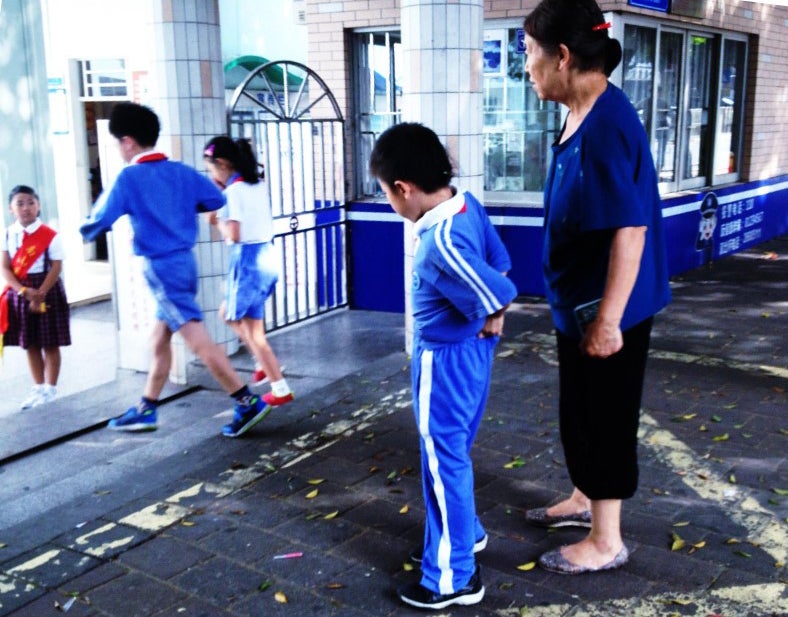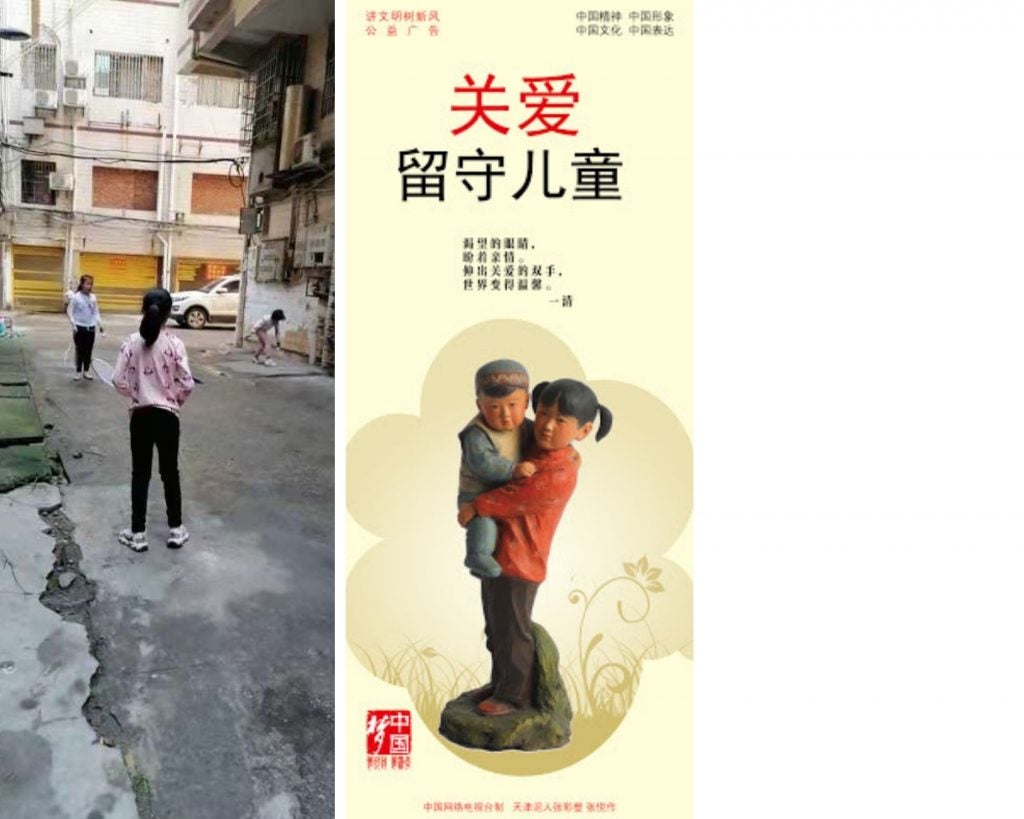Children in China’s great migration: More than victims

China’s economic performance since the late 1970s in transforming a stagnant socialist planned economy into a major economic powerhouse has often been celebrated as a miracle. An inconvenient truth leading to this miracle, however, is an urban development strategy that capitalises on the seemingly unlimited supply of cheap rural migrant labourers while simultaneously limiting their claims in cities, through multi-level exclusionary mechanisms based on the hukou (household registration) system, the equivalent to an internal passport system. As such, though rural migrants are allowed to work in urban areas, their access to social services there is restricted, posing tremendous constraints for them to juggle work and family responsibilities.
Two groups of vulnerable children have emerged as a result, i.e., left-behind children with at least one migrant parent absent in their rural households for extended periods of time, and migrant children who move with their parents to the cities as second-class citizens. According to the All-China Women’s Federation Research Group (2013), in 2010 the number of left-behind children was 61 million and migrant children were 35.8 million.

Stories abound about these children in the domestic and international media, and many are tearful ones. Academic studies also tend to portray them as the unfortunate victims of China’s post-reform modernisation project. To be fair, there is some truth in these narratives, especially regarding the steep structural barriers that hinder these children from enjoying a ‘normal’ childhood. However, such sweeping and lopsided narratives render these children’s own voices, experiences and perspectives invisible, and oftentimes end up aiding the construction of a Culture of Poverty Myth that puts the blame primarily on the non-normative families they live in.
Throughout my PhD project and post-doctoral research, I have developed a line of research that systematically examines how rural migrant families, including the children themselves, negotiate the productive and reproductive engagements in their lives against structural constraints to build a hopeful future in an urbanising society. Through such work, I excavate a rich, complex and multidimensional story about the resiliencies and vulnerabilities of rural migrant families who are the unsung, and disadvantaged, heroes behind the ‘China Miracle’.
Governing left-behind children: Discourses and policies
In a piece published in Current Sociology, through interrogating public discourses based on articles from China Youth Daily and policy documents and circulars issued by the central government and its various ministries since the early 2000s, I examine the discursive and institutional framework addressing ‘the left-behind children problem’ in China within the problematic of the relationship between children, family, and the state. I reveal seemingly ‘disingenuous’ articulations of left-behind children’s value in the mainstream media and official policies.
On the one hand, there seems to be a prevailing concern among the country’s cultural and political elites over the welfare of left-behind children with grave implications for the country’s future development, consistent with a nationalist discourse of social reform and modernisation centring on improving children’s quality in China’s modern history since the 20th century. On the other hand, the dominant discourse in China Youth Daily espouses a Culture of Poverty thesis that attributes left-behind children’s ‘miserable’ plight to their ‘pathological migrant families’, including the ‘non-normative’ family structure that traumatises children’s emotional status, parental negligence of guardianship responsibilities, and grandparents as inadequate and inferior guardians.
This translates into policy efforts to discipline rural migrant families such as by instilling in (grand)parents ‘scientific’ parenting techniques and implementing punitive measures against migrant parents’ lack of physical involvement in childrearing, rather than addressing the political-economic root and social challenges facing these children.
I argue that such inconsistencies should be contextualised in the state’s neoliberal-authoritarian governance of the migrant population in the post-reform era: the state largely maintains the authoritarian citizenship structure (i.e., the hukou system) that allows local urban governments to strategically in/exclude rural migrants as perpetual ‘outsiders’, while blaming migrants and their families for failing to take care of their children left behind in deprived rural communities.
This study foregrounds the role of state policies in structuring the everyday life of left-behind children as well as the ideological manoeuvrings employed to discipline their familial practices, disputing the prevailing analytical frame that treats issues related to left-behind children as a function of their non-normative family structures.
The intergenerational contract in rural migrant families: Resiliencies and vulnerabilities
As mentioned, numerous studies adopt a migrant-family problem paradigm consistent with the Culture of Poverty thesis to examine the impact of parental migration on children’s development, treating children’s outcomes as a function of their family structures. Besides its problematic individualist framing, this line of research also discounts the agency and voices of migrants and their families and reduce them to mechanical automatons at the mercy of social structures.
In a recent publication in Journal of Family Issues, I develop the concept of intergenerational contract to understand the coping strategies of these families, based on longitudinal qualitative data gathered from 38 migrant families (15 with left-behind children and 23 with migrant children) in two provinces.
First, disputing the mainstream discourse on ‘irresponsible’ migrant parents and grandparents who do not sufficiently care for the children, parents and grandparents in this study expressed soaring hopes for the adolescents’ future educational achievement and indicated their support ‘as long as he/she could make it!’; unanimously cited funding for children’s education as the primary motivation for migration; and constantly weighed between different migration trajectories and family living arrangements to better support children’s care and education.
Second, by spatialising generations (and genders) in the division of labour, the families selectively appropriate the hierarchical economic geography to balance work and family arrangements. They develop multi-local and multi-generational living arrangements, with a village home being constructed as the fall-back place mainly occupied by grandparents as stayers or substitute caregivers of children, an affordable apartment (self-owned or rental) in the county seat as the relocation place when the middle generation (at least one parent) return to form a nuclear core with their children, and a temporary rental room in host cities perched by migrant parent(s), with/out their children.
Such spatial strategies form an ever-changing support network for children who engage in pendulum movements across different locations, shifting between the left-behind status and that as migrants. Last, at the receiving end of care and support in their families, children engage in emotional labour guided by an ethics of sacrifice and indebtedness, by articulating one’s appreciation of adults’ sacrifices, managing one’s ‘undesirable’ emotions, and striving to achieve better academic outcomes.
The study uncovers coexisting resiliencies and vulnerabilities of rural migrant families in contemporary China. On the one hand, we see that family mediates the negative impact of structural inequality on children’s wellbeing by pooling resources and efforts to nurture and support them. On the other hand, we also see acts of sacrifice by all individual members to advance the family’s collective welfare, including migrant mother’s double shift of conducting housework and paid work, grandparents’ malleable and marginal role as the reserve work force in the domestic sphere and children’s emotional labour to present their proper selves.
Migrant children’s education: Hopes and hurdles
How do migrants’ children fare in educational achievement, a crucial indicator of an individual’s socioeconomic attainment in modern societies, relative to comparable groups? This is an important question for China’s long-term development, considering that these children represent a crucial component of future Chinese society, and for the future prospects of migrant families, given their strong motivation to boost their children’s education for future social mobility as depicted above.
Prof. Jean Yeung and I published an empirical paper last year in Chinese Sociological Review to answer this question. Combining multilevel modelling and field research, we find huge gaps in cognitive skills (measured by verbal and math test scores) between migrant children and their urban local counterparts based on national representative data, and reveal multi-layered factors in a nested system of inequality that impacts migrant children’s performance in complicated ways.
At the family level, in-depth interviews record parents’ soaring aspirations for children’s educational success as a family social mobility project. However, cumulative socioeconomic disadvantage, the spill-over of migrant parents’ job precarity and stress, and strained intergenerational ties due to prior family separation constitute major barriers that suppress migrant children’s educational performance. At the school level, a de facto segregation system disproportionately channels them to schools less favourable in ranking, resources and academic climate, and rampant social discrimination at school also hampers migrant children’s adaptation and performance.
Concluding remarks
Under the shadow of China’s post-reform economic miracle is a rich, complex and multidimensional story of rural migrants and their families ‘doing family’ towards building their hopeful futures, against arduous institutional and socioeconomic barriers. I call for more equitable and inclusive social policies to redress institutional discrimination against the migrant population and tap into the tremendous potential that children of migrants could offer for China’s future development.
About the Post
This post was written based on three of the author’s single-authored or co-authored articles published in leading journals, including ‘Save the children!’: Governing left-behind children through family in China’s Great Migration’ (Gu 2021) published as part of a special issue edited by the author on shifting valuation of children in the Global South in the journal Current Sociology, ‘Sacrifice and indebtedness: The intergenerational contract in Chinese rural migrant families’ (Gu 2021) published in Journal of Family Issues, and “Hopes and hurdles: Rural migrant children’s education in urban China’ (Gu and Yeung 2020) in Chinese Sociological Review.
Gu Xiaorong is a Research Fellow in Asia Research Institute at the National University of Singapore. She has written widely on the educational issues of children and adolescents in China. Her work engages broadly with the sociology of childhood and youth, migration studies, family sociology, education, social stratification, China’s political economy and mixed-methods research. She is the guest editor of two special issues, with Child Indicators Research and Current Sociology respectively, on shifting valuation of children in Asia and the Global South at large.
The views expressed in this forum are those of the individual authors and do not represent the views of the Asia Research Institute, National University of Singapore, or the institutions to which the authors are attached.
I have developed a line of research that systematically examines how rural migrant families, including the children themselves, negotiate the productive and reproductive engagements in their lives against structural constraints to build a hopeful future in an urbanising society.





